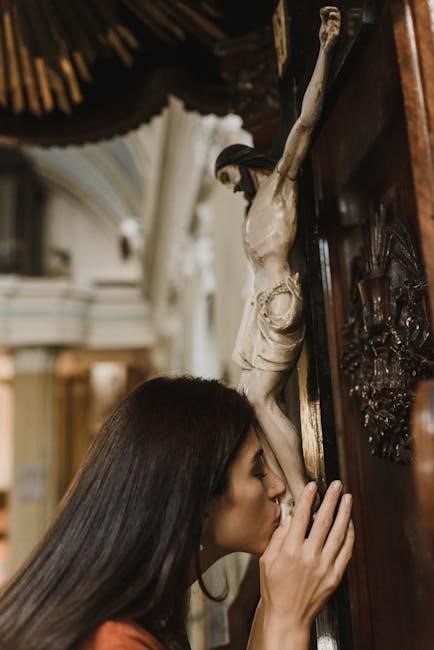“El Niño Jesús No Odia a los Mariquitas” is a controversial satirical book by Don Julio, sparking debates on homophobia and age appropriateness through its unique, provocative approach․
1․1 Overview of “El Niño Jesús No Odia a los Mariquitas”
“El Niño Jesús No Odia a los Mariquitas” is a satirical comic book by Don Julio, published by Fandogamia Editorial․ It combines colorful, childlike illustrations with provocative content, sparking debates on homophobia and freedom of expression․ The book, initially marketed as a children’s activity book, contains adult themes, leading to controversy over its appropriate audience․ Its satirical approach critiques societal attitudes toward LGBTQ+ issues, blending humor with social commentary․
1․2 Themes and Objectives of the Book
The book’s primary theme is a satirical critique of homophobia, using humor and irony to challenge societal prejudices․ Its objective is to provoke reflection on LGBTQ+ rights through controversial imagery and text, blending religious and sexual themes․ By presenting adult content in a childlike format, Don Julio aims to highlight the absurdity of censorship and societal hypocrisy, encouraging open dialogue on taboo subjects․
Background of the Author
Don Julio (Julio A․ Serrano) is a renowned Spanish author known for his satirical and controversial works․ His writing often critiques societal norms, blending humor with provocative themes․
2․1 Who is Don Julio (Julio A․ Serrano)?
Don Julio, whose real name is Julio A․ Serrano, is a Spanish writer and satirist known for his provocative and controversial works․ He often uses humor and irony to critique societal norms, particularly focusing on religion, sexuality, and cultural issues․ His writing style is bold and unconventional, aiming to spark debates and challenge traditional viewpoints․ Serrano’s works have gained both acclaim and criticism, making him a polarizing figure in contemporary literature․
2․2 His Previous Works and Style
Don Julio, or Julio A․ Serrano, is known for his provocative and satirical writing style․ His previous works often blend dark humor with social commentary, targeting themes like religion and sexuality․ This book continues his tradition of using satire to challenge societal norms, employing bold imagery and irreverent dialogue․ His style, which mixes humor with sharp critique, has led to both acclaim and controversy, as seen in his latest work․
The Controversy Surrounding the Book
“El Niño Jesús No Odia a los Mariquitas” has sparked intense debate due to its provocative content and satirical approach to sensitive topics, leading to widespread public outcry and divided opinions․
3․1 The Book’s Content and Its Critics
“El Niño Jesús No Odia a los Mariquitas” is a satirical comic that uses a childlike design to critique homophobia, blending humor with controversial themes․ Critics argue its explicit content, including sexual references, is inappropriate for its advertised age range, sparking outrage․ While the book aims to challenge societal norms, its provocative approach has led to accusations of blasphemy and moral corruption, dividing public opinion sharply․
3․2 The Debate Over Appropriate Age Range
“El Niño Jesús No Odia a los Mariquitas” has ignited a heated debate about its suitability for children․ Marketed as a coloring book for ages 6+, critics argue its explicit content and satirical tone are clearly intended for adults․ This mismatch has led to accusations of deceptive marketing, with many questioning how such material was approved for young audiences, further fueling the controversy surrounding its release and purpose․
Legal Battles and Challenges
The book faced legal challenges due to its explicit content, with lawsuits claiming it was inappropriate for children․ Courts ultimately ruled in favor of the publisher, stating it was not intended for minors, resolving the legal disputes surrounding its distribution and content․
4․1 Lawsuits and Legal Proceedings
The book sparked legal actions as Christian lawyers claimed it targeted children with explicit content․ Courts reviewed the case, with the publisher arguing it was satirical and not intended for minors․ The legal battle centered on whether the content was inappropriate for its stated audience, highlighting the fine line between satire and obscenity․ The proceedings drew significant attention, underscoring the book’s controversial nature and its impact on freedom of expression debates․
4․2 Court Rulings and Outcome
The court ultimately dismissed the case, ruling that El Niño Jesús No Odia a los Mariquitas was not intended for children despite its colorful design․ Judges agreed with the publisher’s argument that the book was satirical, targeting adult audiences․ This decision reaffirmed the distinction between satire and obscenity, allowing the book to remain in circulation․ The ruling also highlighted the importance of artistic freedom and the need for clear audience designation in controversial works․
Public Reaction and Media Coverage
The book sparked intense public debate, with supporters praising its satirical take on homophobia and critics condemning its explicit content․ Social media platforms like Twitter and Reddit saw heated discussions, while mainstream media outlets like The Guardian and El País covered the controversy extensively, highlighting the book’s polarizing impact on society and culture․
5․1 Social Media and Online Discussions
The book went viral on social media, sparking fierce debates․ Twitter and Reddit saw divided opinions, with supporters praising its bold satire and critics slamming its content․ A viral post questioned parents’ oversight, while others highlighted its role in challenging homophobia․ The controversy even reached Elon Musk, underscoring its cultural impact and the broader discussion on free speech and artistic expression․
5․2 Mainstream Media Coverage
The book garnered significant attention from mainstream media, with outlets highlighting its controversial content and legal battles․ News platforms covered the viral video by Fernando Igle, sparking widespread debate․ Major media discussed the book’s satirical intent versus its perceived blasphemy and obscenity․ The court’s ruling clarifying it as non-children’s content was widely reported, alongside its availability on platforms like Amazon and Agapea, despite ongoing criticism․

Cultural and Social Impact
“El Niño Jesús No Odia a los Mariquitas” sparked cultural debates, challenging societal norms and religious sensitivities․ Its satirical approach to homophobia influenced LGBTQ+ discussions and satirical literature․
6․1 The Book’s Role in LGBTQ+ Discussions
“El Niño Jesús No Odia a los Mariquitas” has become a catalyst for LGBTQ+ discussions, challenging homophobia through satire․ Its provocative content sparks debates on acceptance, fostering dialogue about inclusivity and representation․ Critics argue it pushes boundaries too far, while supporters praise its bold approach to normalizing queer themes․ The book’s viral impact highlights its role in modern LGBTQ+ advocacy, despite controversy surrounding its explicit nature and intended audience․
6․2 Its Influence on Satirical Literature
“El Niño Jesús No Odia a los Mariquitas” has redefined satirical literature by blending humor with provocative commentary on societal norms․ Its controversial approach challenges traditional satire, inspiring debates about artistic freedom and the limits of comedy․ The book’s viral success has encouraged other writers to embrace bold, unconventional storytelling, solidifying its place as a groundbreaking work in modern satirical literature․

How to Access the Book
“El Niño Jesús No Odia a los Mariquitas” can be purchased online with free shipping or downloaded as a free PDF from various platforms like Fandogamia Editorial․
7․1 Purchase Options and Availability
The book “El Niño Jesús No Odia a los Mariquitas” is available for purchase through online retailers like Amazon and Fandogamia Editorial․ It can be bought as a paperback or downloaded as a free PDF․ The publisher offers free shipping for orders exceeding a certain amount, making it accessible to a wide audience․ Additionally, the book is listed on platforms like Agapea․com, ensuring easy availability for readers interested in satirical literature․
7․2 Free PDF Downloads and Online Access
Free PDF downloads of “El Niño Jesús No Odia a los Mariquitas” are widely available online, despite its controversial nature․ The book can be accessed through various forums and websites, with some platforms offering it for free due to its satirical and provocative content․ However, its availability has sparked debates, as it challenges traditional norms and raises questions about appropriate content distribution․ The free PDF version remains a sought-after resource for those interested in its unique perspective․

The Author’s Perspective
Don Julio crafted the book to provoke reflection on societal norms, using satire to critique homophobia while sparking debates on freedom of expression and artistic intent․
8․1 Don Julio’s Statements and Intentions
Don Julio aimed to challenge societal norms through satire, addressing homophobia with provocative humor․ He intended to spark dialogue on acceptance and equality, using the book’s controversial content to highlight hypocrisy and promote understanding․ By blending religious and LGBTQ+ themes, he sought to critique intolerance and encourage open conversations about identity and inclusion․
8․2 His Response to Critics
Don Julio defended his work, emphasizing its satirical intent to expose hypocrisy and challenge homophobia․ He criticized double standards, arguing that his book’s controversial content reflects societal issues rather than promoting them․ Julio asserted that critics often misinterpreted the book’s purpose, which was to provoke dialogue and encourage acceptance․ He maintained that the legal rulings in his favor validated the book’s artistic and satirical value․

Historical Context of Similar Works
Spanish satirical literature has long challenged religious and social norms, with works like “El Niño Jesús No Odia a los Mariquitas” fitting into this tradition, blending humor with sharp critique․
9․1 Satirical Literature in Spain
Satirical literature in Spain has a rich tradition of challenging societal norms and religious themes․ “El Niño Jesús No Odia a los Mariquitas” fits into this lineage, using parody and provocative themes to critique homophobia; Its childlike design contrasts with adult satire, mirroring Spain’s history of blending humor with sharp social commentary․ This approach has made it a notable example of contemporary satirical works that spark both debate and reflection․
9․2 Religious Themes in Contemporary Art
Religious themes in contemporary art often provoke dialogue by blending sacred imagery with modern issues․ “El Niño Jesús No Odia a los Mariquitas” exemplifies this trend, using Jesus as a symbol of acceptance to challenge homophobia․ Its satirical approach mirrors broader artistic movements that reinterpret religious icons to address social justice, sparking debates on faith, identity, and cultural values in today’s society․
“El Niño Jesús No Odia a los Mariquitas” sparks crucial discussions on homophobia and acceptance, blending satire with religious themes to challenge societal norms and inspire reflection․
10․1 Summary of Key Points
“El Niño Jesús No Odia a los Mariquitas” is a satirical book by Don Julio, aiming to challenge homophobia through provocative content․ It sparked controversy due to its explicit themes and perceived inappropriateness for children․ Legal battles ensued, with courts ultimately ruling it not suitable for minors․ The book has become a focal point in discussions about LGBTQ+ rights, freedom of expression, and the boundaries of satire, leaving a lasting cultural impact․
10․2 Final Thoughts on the Book’s Significance
“El Niño Jesús No Odia a los Mariquitas” serves as a bold commentary on societal norms, using satire to provoke dialogue on homophobia and freedom of expression․ Its controversial nature has sparked essential conversations about the role of art in challenging prejudices․ While divisive, the book underscores the importance of exploring sensitive topics through creative mediums, leaving a lasting impact on cultural and social discourse․
